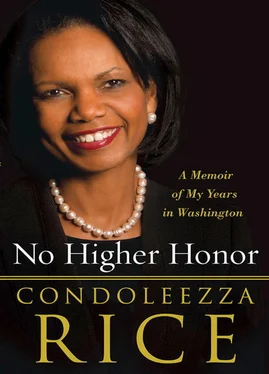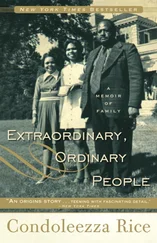Gaza Again
INDEED, THE CONFLICT exploded one last time as 2008 came to a close. Tensions had been rising in Gaza throughout November and into December as Hamas fired rockets into southern Israeli population centers in violation of a fragile summer ceasefire. During his last visit to Washington, Olmert made clear that the situation was becoming intolerable. He told the President that he could not let Israel’s enemies take advantage of what they might read as a political vacuum, pending elections.
On Christmas Day, Tzipi Livni called to say the Israelis would have to act. The Israelis never asked for permission, and we never gave it. Thanks to the warning, though, I wasn’t surprised when, on December 27, Israel launched a massive attack into Gaza, hitting a hundred preplanned targets within a span of 220 seconds. The bombardment continued, leading ultimately to a ground invasion on January 3. Needless to say, my last holiday week was not as I’d imagined. I sat in my cousin’s home, on the phone trying to get the Israelis, the Egyptians, and the Arabs to establish terms for a ceasefire.
When it came to Israel’s responses to provocations, I’d become accustomed to the diplomatic pattern of initial outrage at the terrorists, followed by human suffering, culminating in a condemnation of Israel. Under pressure from the Arabs, the UN Security Council called a meeting on the situation in Gaza. I left for New York, hoping to avoid a formal resolution because I didn’t want the United States to veto an end to the war.
I called Olmert and tried to get a sense of when he could end the operation. He was noncommittal, saying that he had to wipe out the threat to the civilian populations. I told him I’d try to hold off a resolution. Olmert said that Sarkozy was in the same frame of mind. Good , I thought. With the support of the French and the British we ought to be able to avoid a resolution . I went to bed assuming that we’d prevented a diplomatic crisis, and, with that in mind, I planned to go home the next day, after the Security Council meeting in New York.
What happened next was bizarre. The Arabs had gathered and asked to see the members of the P5. Lavrov had not attended the meeting, and neither had Chinese Foreign Minister Yang Jiechi. Bernard Kouchner and David Miliband, my French and British counterparts, and I went to meet with the Arabs. I fully expected unity, but after hearing their hostile and emotional presentation, Kouchner suddenly said, “You’re right. There should be a resolution to stop the fighting.” I looked at David, who just shrugged. We left the meeting.
“What are you doing?” I asked Bernard. “Your President told Olmert there should be no resolution.”
Bernard was a bit defensive but retorted, “The Arabs won’t accept no resolution. I have to go with them.” Now what? I thought.
I rushed back to the holding room and called Steve Hadley, describing what had happened. He reached his French counterpart, but there was clearly a split between the Élysée Palace (the presidency) and the Quai d’Orsay (the Foreign Ministry). I returned to the room with the Arabs and said that we’d work with them on a resolution. “I will stay here tonight to see if we can find a solution,” I said. My own view had been colored by a call from Abbas, who had begged me for a resolution. “There will be a ‘day of rage’ tomorrow, and I’m not sure we can keep the West Bank quiet. Salam [Fayyad] is very worried.”
After many hours—we worked until about nine at night—we negotiated a resolution. It was far from perfect. I would have preferred a stronger condemnation of Hamas, but it did not condemn Israel and at least mentioned the need to stop terrorism.
Olmert, when he called me in New York, was enraged. He thought I’d double-crossed him by agreeing to a resolution. “Your problem, Prime Minister,” I told him, “was with the French. I thought you said Sarkozy was with you.”
Tzipi Livni, who would stand for election as prime minister in a few weeks, called too. “This is a disaster,” she said.
“You haven’t even read it,” I countered. “Would it help if the U.S. abstains?”
“Yes, it would,” she answered.
I dialed the President and caught up with him in the White House residence. He’d just heard from the angry Olmert.
All of my colleagues were gathered in the Security Council chamber. I knew that everyone would vote yes, and I had, after all, negotiated the resolution. “How do you want me to vote?” I asked the President.
“How do you want to vote?” he responded.
“On balance I would vote yes, but I’ll certainly understand if you want me to abstain.”
“We need to abstain,” he said.
And so I did, casting the only vote that wasn’t in the affirmative. As I was leaving, the Saudi and UAE foreign ministers came over to the car. “You are a good friend,” they said, thanking me for letting the resolution go forward. “This helps us immensely.”
I felt bad that my last vote in the United Nations was, in a sense, against the Israelis. In reality, it was worse than that: it wasn’t for anyone, and it wasn’t against anyone. Sometimes that’s the best you can do, but it felt empty. The next day Olmert told the press that the President had overruled me. You snake! I fumed. I called him and yelled at him about it and I told the President I would never trust Olmert again. It doesn’t matter , I told myself. We’re done .
But we weren’t quite done. The Israelis didn’t stop their offensive right away, and Tzipi and Olmert needed our help in getting a basis on which to do so. As I’d done so many times, I shuttled by phone among the Egyptians, the Israelis, and the Palestinians to find a solution. The question was whether we could find a reliable way to close the tunnels Hamas was using to smuggle weapons into Gaza. If the Israeli government could tell its people that that had been achieved, it could end the military operation.
After several days, we were pretty close to an agreed-upon set of arrangements, with the Egyptians playing a major role—supported by our training and technical assistance—in shutting off the arms supply.
It was Thursday, January 15, a day before I would leave the State Department for good. Tzipi Livni was on the phone. “I need to come there and sign the document. We need a visible demonstration that the U.S. will guarantee these arrangements,” she said.
“Tzipi, there isn’t time. I’m leaving office tomorrow. Why don’t we just make an announcement in our respective capitals?”
But she persisted. “I’m leaving tonight, and I’ll be there tomorrow morning.” I realized that the Israelis needed this one last show of support and that Tzipi, because of her bid to become prime minister, needed it most of all. I guess I can do this one more time , I decided.
And so, one hour before I said good-bye to the State Department, I sat in the Treaty Room and signed a memorandum of understanding on terms for an end to the latest conflict in Gaza.
I said good-bye to Tzipi at the seventh-floor elevator. “Thank you,” she said, “for your friendship and your support of Israel. Come to visit. You’ll always be welcome.” I hugged her, thanked her for all we’d done together, and wished her good luck in the elections.
Then I walked back to my office and wrote a little note to Hillary Clinton. It’s customary for the outgoing secretary to leave last thoughts. I didn’t say anything elaborate, and what I did say will remain between the two of us. I was very, very glad to be done.
“Time to go,” I said to Brian as we headed down the elevator and into the lobby where the State Department’s employees were gathered. I looked out at the faces, some of which I knew well and some I didn’t really know at all. I thanked them all just the same and walked out of the front door for the last time as “S.” My car was waiting to take me to Camp David, where I’d meet up with the President and some of his closest senior staff. The weekend was busy because there were myriad details that had to be tied down in association with the Gaza agreement. But I tried to enjoy it and take in the atmosphere one final time.
Читать дальше












